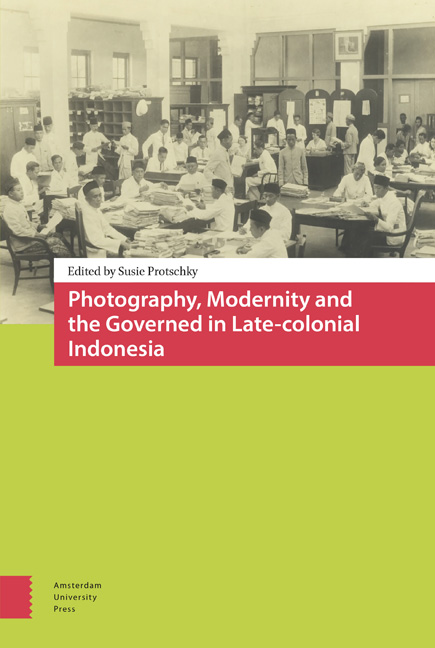Book contents
- Frontmatter
- Contents
- Acknowledgments
- Part I Governing Lenses on Ethical Policy and Practice
- 1 Camera Ethica: Photography, modernity and the governed in late-colonial Indonesia
- 2 Ethical policies in moving pictures: The films of J.C. Lamster
- 3 Ethical projects, ethnographic orders and colonial notions of modernity in Dutch Borneo: G.L. Tichelman's Queen's Birthday photographs from the late 1920s
- 4 Saving the children?: The Ethical Policy and photographs of colonial atrocity during the Aceh War
- Part II Local Lenses on Living in an “Ethical” Indies
- 5 Interracial unions and the Ethical Policy: The representation of the everyday in Indo-European family photo albums
- 6 Reversing the lens: Kartini's image of a modernised Java
- 7 Modelling modernity: Ethnic Chinese photography in the ethical era
- 8 Modernity and middle classes in the Netherlands Indies: Cultivating cultural citizenship
- 9 Say “cheese”: Images of captivity in Boven Digoel (1927-43)
6 - Reversing the lens: Kartini's image of a modernised Java
Published online by Cambridge University Press: 11 December 2020
- Frontmatter
- Contents
- Acknowledgments
- Part I Governing Lenses on Ethical Policy and Practice
- 1 Camera Ethica: Photography, modernity and the governed in late-colonial Indonesia
- 2 Ethical policies in moving pictures: The films of J.C. Lamster
- 3 Ethical projects, ethnographic orders and colonial notions of modernity in Dutch Borneo: G.L. Tichelman's Queen's Birthday photographs from the late 1920s
- 4 Saving the children?: The Ethical Policy and photographs of colonial atrocity during the Aceh War
- Part II Local Lenses on Living in an “Ethical” Indies
- 5 Interracial unions and the Ethical Policy: The representation of the everyday in Indo-European family photo albums
- 6 Reversing the lens: Kartini's image of a modernised Java
- 7 Modelling modernity: Ethnic Chinese photography in the ethical era
- 8 Modernity and middle classes in the Netherlands Indies: Cultivating cultural citizenship
- 9 Say “cheese”: Images of captivity in Boven Digoel (1927-43)
Summary
Introduction
Raden Ajeng Kartini (1879-1904), generally known for her advocacy of the emancipation of Javanese women, is an iconic figure in the history of the socalled “ethical period” in the Netherlands Indies. Born into an old Javanese dynasty that had developed a long association with the Dutch colonial regime, Kartini was brought up in a household which both benefited from and was critical of colonialism. Part of a second generation of a Javanese elite family that consciously sought out Western education, she reflected the new sense of nationalist consciousness emerging in such circles. Asserting the right of Javanese to access Western education and to participate in the development of their own society, her scathing criticism of contemporary colonial practice and her appeal for recognition of the rights of Javanese women, expressed in both private correspondence and public petitions, appeared also to echo the central tenets of a Dutch agenda to reform colonial policy and practice. Still largely isolated at the beginning of the twentieth century and often designated by critics as unrealistic idealists, these “ethici” (the European supporters of reform) advocated a policy of intervention to “uplift” and civilise the inhabitants of the Indies.
As awareness of this opinionated, Dutch-writing Javanese woman spread in Java and the metropolitan Netherlands between 1898 and 1904, Kartini became a reference point for competing agendas in an emerging debate on the new direction of colonial politics within both Javanese and European society. Published extracts of her correspondence in the decade after her death became a vehicle for promoting the cause of colonial reform. Kartini herself, however, aimed at a far more radical agenda than European progressives of her day envisaged or the Javanese “establishment” was prepared to tolerate. Rather than echo the discourse of a mission civilisatrice that her European acquaintances espoused, she sought to exploit the hesitant and paternalistic voices of the so-called “ethical period” to communicate an image of a vital and self-assured Java capable of its own renovation. In so doing she made a strategic attempt to exploit the opportunity presented by this apparent newfound interest in native welfare to reverse traditional colonial perspectives on Javanese.
- Type
- Chapter
- Information
- Publisher: Amsterdam University PressPrint publication year: 2015

